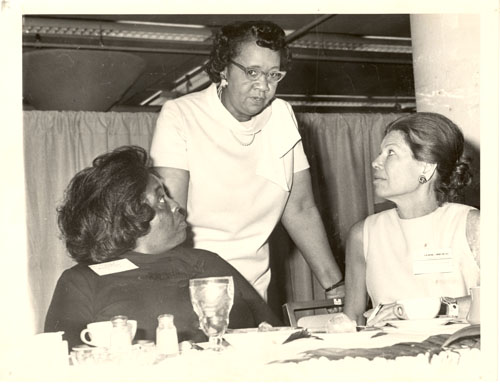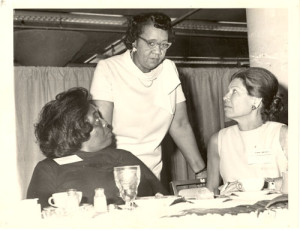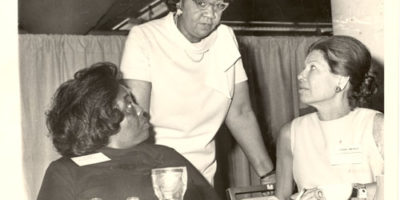
Wednesdays in Mississippi

National Park Services; Mary Mcleod Bethune Council House National Historic Site; DC-WAMMB; National Archives For Black Women’s History. Photographer unknown.
In that watershed year of “Freedom Summer” — 1964 — the National Council of Negro Women (NCNW) invented a women’s social-change project to support the civil rights movement; they named it Wednesdays in Mississippi. The project’s middle-class organizers were all women; the staff was all female, and so were the participants. Week after week, for two summers, interracial and interfaith teams of Northern women flew into Jackson, Mississippi. My mother, Polly Spiegel Cowan — white, Jewish, a Northerner and a member of the National Council of Negro Women — was one of the creators of this unprecedented exercise in boundary-crossing.
The women would arrive in Jackson on a Tuesday and fan out across the state, to towns like Canton and Vicksburg, and fly home from Jackson on a Thursday. On Wednesdays, these women met — often in secret — with civil rights activists and African-American professional women across Mississippi. In Meridian, for example, they learned first-hand about race and education from Jennie Ruth Crump, the principal of the all-Black grade school in the state’s first brick school building for African-American children. It had been built in 1894 and named in honor of Rabbi Abraham Wechsler, who led the effort to build the school.
The mission of Wednesdays in Mississippi (sometimes known by its initials WIMS) was to use the resources of middle-aged and middle-class Northern women to build bridges of understanding between African-American and white women, develop connections with women of the South and to support these Southern women, whom they saw as the “shock absorbers of change.” In 1964, this mission could mean facing danger, as one WIMS woman learned when, while making a call from a public phone booth, she turned around to see a lit, sputtering bomb rolling straight at her. The process was not easy that first summer, especially for Mississippi white women who often could not bring themselves to invite white WIMS women into their homes, even behind tightly drawn curtains. Black Northern women found an easier welcome among their Southern counterparts. Because a number of them were engaged in all-Black businesses, they were not so susceptible to white economic threats. All were professional women: schoolteachers, business owners, nurses, librarians.
And because of the danger to all the women involved, WIMS “quarantined” (we might say embargoed) any news of their activities that fraught summer. They wanted no photographs, and no news was to be reported in the press — Northern or Southern. The embargo may be one reason this story was late to emerge. Another — more powerful — silencing was that most civil rights historians believed that WIMS was not radical enough to be worthy of the attention. The women were too middle-class, too middle-aged…. Now, with a new book and a film on the horizon, we can see how subversive WIMS really was, though not all subversion wears the same clothes.
The creators and leaders of Wednesdays in Mississippi were my mother and Dorothy Height. Height was the national president of the NCNW and guiding spirit behind all of its work. My mother was a former radio and television producer, a community activist, and the project’s volunteer executive director. The two women worked with each other seamlessly and conferred with each other constantly, sharing their dreams and plotting their course. But their roots were very different. Dorothy Height (whom we Cowan children called by her first name at home, but whom we always addressed as Miss Height in public) was an African-American Christian who had dedicated her life to racial, social, and economic justice, to the “job of making [America] a place where everyone is not only protected, but has the full rights to justice and the pursuit of happiness we hold so dear.” In contrast, my mother was less certain about her own motives: “What was there in my life’s experience,” she later asked in her unpublished memoir, “that led me to the Black Movement with an emphasis on work in the South?”
I’ve been trying to explore this question for years. What made a Jewish woman like Polly Cowan “work,” as she later wrote, “23 hours a day … [When] in no other movement and at no other time of my life have I dared the things I did between 1963 and 1968?” What was the wellspring of her social activism? And does the outline of her life mesh with the larger history of Jewish women of her era and age, women who were born in the first quarter of the 20th century, came of age during the second quarter, and participated in the movement for civil rights in the third?
——
For me, this question is intensely personal. Many years after my mother died, Dorothy Height told me that she’d had a repeated conversation with my mother in which she asked my mother if her commitment to civil rights was rooted in her religious beliefs. Height’s faith was core to her actions. My mother, however, considered religion a cause of war and a curse to mankind. Height could never understand my mother’s insistence that she herself lacked any religious sensibility, but instead harbored deep skepticism and distaste for any formal religious structure. Yet here I am, nearly a half century later, revisiting Dorothy Height’s probing question.
Height and Cowan met during the summer of 1963. Civil disobedience in Georgia, Alabama, and Mississippi had escalated, and white segregationists were retaliating with brazen acts of violence. Brutality abounded. Women and children were being beaten and thrown in jail. The national leaders of the major civil rights organizations met to exchange ideas and broaden their search for financial support when a white philanthropist, Stephen Currier, decided to help. In June of 1963, Currier invited a number of wealthy white New Yorkers to meet for a breakfast at the Carlyle Hotel — and reach into their pockets for civil rights. My parents attended the meeting, and my mother was so stirred she started writing position papers about what she thought could be done. When Currier asked the civil rights leaders if any of them wanted a volunteer, all the men said no, but Height said yes, “if it is the one who’s writing those papers.”
That fall, after the historic March on Washington, and after Height had fought fruitlessly to include women among the civil rights leaders who appeared on the podium that day, a veteran Student Nonviolent Coordinating Committee worker phoned Height from Selma, Alabama. Conditions were terrible, Prathia Hall reported. Hall needed help. Height and my mother decided to go to Selma themselves. While there, my mother got caught up in the excitement and momentum of a civil rights meeting and agreed to speak from the podium. Thereafter, no one in the Selma white community dared talk to her. The trip a failure, it taught my mother a quick lesson in Southern mores; if you wanted to build bridges to white, liberal middle-aged Southern women, you had to tread lightly.
Soon after that my mother came up with the idea that interracial and interfaith groups of high-powered women could go south. Height talked to her YWCA colleagues, and pulled in three other religion-based groups, including the National Council of Jewish Women (NCJW). With a base of five women’s organizations, they began to move. They decided to focus on the problems of Mississippi. They all knew that Bob Moses — with the Council of Federated Organizations — was bringing college students from all over the United States to go to Mississippi the summer of 1964 to breach the walls of Jim Crow. This was “Freedom Summer,” the genesis of Wednesdays in Mississippi.
Wednesdays in Mississippi was a unique civil rights program. Looking at civil rights through the lens of women, it focused on poverty, literacy, women, and children. The WIMS women were a generation older than the men and women who flocked to Freedom Summer with the Student Nonviolent Coordinating Committee (SNCC), and they were committed to a model that was both interfaith and interregional. WIMS was always about Black liberation as part of human liberation, and justice for African Americans as part of justice for all people — everywhere in the world. Wednesdays in Mississippi was going to be their road to freedom.
Polly Spiegel Cowan was born in 1913. The Spiegels had emigrated from Germany sometime around 1850 and made their way to Chicago, where they became wealthy merchants. My mother’s parents moved to Kenilworth, Illinois, where she grew up in a very beautiful, very wealthy, and entirely Christian enclave. At school she had no Jewish friends. As a teenager in the 1920s this meant that she played sports with all the other girls, studied with them, and went to their houses for dinner and sleepovers, but was never invited to their parties and dances. Her parents, aware of this situation or not, were themselves deeply ambivalent about their own relationship to Judaism and the Jewish community. They sought spiritual meaning in their lives, I’m told, but could not find it in the Reform temples of their community. They would not have dreamed of searching for it among Conservative or Orthodox Jews, whose rites and rituals, language and sounds, food and dress, were utterly alien to them. They turned instead to Christian Science to satisfy their longing for some transcendent meaning. Despite this, all of their friends were Jewish. And my grandfather founded the local Jewish country club, which became the family’s real temple and community.
My grandmother Lena sent my mother off to Sarah Lawrence College, where she encountered the New Deal New York of the 1930s. An anti-fascist from 1936 onward, Polly was a member of the generation raised on the ideals of Franklin D. Roosevelt’s New Deal and Eleanor Roosevelt’s progressivism. As a graduate student at the University of Chicago she began fundraising for anti-Nazi rescue committees.
My mother married Lou Cowan, my father, in 1939. They moved to New York during World War II, and in 1952 my father headed up Adlai Stevenson’s media campaign while my mother took charge of women volunteers for Stevenson. When my father was offered a job at CBS, first as vice-president for creative affairs and then to head the New York flagship station WCBS, he took it, and sold his own media company. My father’s decision required my mother to reinvent herself. She had to leave her own position as a media producer to avoid a potential conflict of interest, and this required her to shift her professional focus. She shopped around for a new life. Eventually she volunteered for the Citizens Committee for Children, and from there moved to the National Council of Negro Women.
My parents had long been involved somewhat peripherally in civil rights. By 1954, my mother had become a board member of Wiltwyck, the first racially integrated reform school for boys, and a pet project of Eleanor Roosevelt’s. My parents sent me and my siblings to a Manhattan private school, Dalton, that was racially integrated by the 1940s. As my parents made friends among the school parents, my mother came to realize that “even the most privileged Negroes suffered from discrimination: in housing, in education, job opportunities, political offices, cultural advantages.”
In an unpublished autobiography, my mother explored the roots of her commitment to racial justice. She made many revisions to this memoir, and as I read modification after modification, I saw that the more she wrote, the more her identity as an American Jew surfaced. At first she rarely mentions it; by the end it holds the center of the narrative. For her, being Jewish is always about persecution: being left out of the social life of her high school years, raising money for Jewish refugees, signing affidavits to get Jews out of Germany, discovering housing discrimination in New York.
My mother drew on her Jewish past to explain her commitment to civil rights and racial justice. She also believed that there are moments in history that compel you to act. For my mother, the civil rights movement was such a moment; it opened a door for her to act directly, beyond the dinner parties or friendships, petition-signing and charity.
My mother became a teenager and young adult after the great Jewish immigration to America. While a member of a Midwestern, wealthy, German community, she would have shared in the growing sense of being an American, rather than a hyphenated ethnic. Her instincts were liberal, as were those of the majority of Jews of her generation. She talked with her peers about the growth of fascism in Europe, and sympathized with the increasingly weak Republican forces in Spain. Being Jewish felt central to this work. For my parents World War II was fought not simply to defeat the Axis, but to defend the Jews.
When my parents moved to New York City in 1942 they still feared the anti-Jewish attitudes of their neighbors in the German section of Yorkville. For my mother, the New Deal was important in part because the Roosevelts seemed to be the defenders of the Jews. Federal agencies hired Jews who were unacceptable to traditional law or accounting firms.
My parents never talked about living in a Jewish enclave, and indeed during these years of assimilation they strove to widen the boundaries of their world to include non-Jews. But they always lived their lives, at least as a family and as a couple, in a predominantly Jewish world. This Jewishness was hidden under a secular blanket; we celebrated Christmas and hunted for eggs on Easter, and never, ever had a Passover seder. Yet there must have been a deeper Jewish current running through our household, as my brother Paul Cowan went on to write about recovering his Jewish past, my sister-in-law Rachel Cowan became the first woman convert and rabbi in America, and my own son is now the Orthodox rabbi at the University
of Pennsylvania.
In the argument between Dorothy Height and Polly Cowan over whether my mother’s actions had any religious wellspring, who was right? Height, in her belief that only a religious commitment could have led my mother down the path she had taken, or my mother, who remained anti-religious to the day she died?
Here is my answer. My mother’s response was both right and wrong. She correctly replied that, for her, the strength of her belief in social and racial justice was not rooted in a belief in God or in any spiritual belief system of the kind Height implied. She did hate religion and she and my father raised us as entirely secular Jews. By the 1950s she understood that Jews had at least partially integrated into the nation, in a way that African Americans had not yet been able to do.
My mother’s world was defined by Eleanor Roosevelt’s Universal Declaration of Human Rights and infiltrated by the fears of the Cold War. In the 1960s both of my brothers joined the civil rights movement and went to Mississippi; they also both traveled in Israel, one spending a summer on a kibbutz, the other taking a semester off from college to work with poor immigrant Jews in Beersheba. And my mother, like so many of her peers, believed that women could best act through women’s voluntary organizations. They were the daughters of the Progressive Movement.
In the decade following the end of World War II, many Reform and Conservative Jews believed that the way to practice their Judaism was through social justice. As Jews became more accepted in the U.S. the practice of Judaism generated for many a religious duty to extend social action toward African Americans. In this regard, my mother’s work with Dorothy Height was connected to the impulses of other Jews.
This era of universalism ended in the late 1960s, perhaps because of Jewish pride in the wake of the Six Day War, or perhaps because — as I remember from my own experience — the rise of Black Power, a movement which deliberately excluded most whites. But Dorothy Height adhered to her vision of integration and human rights, and my mother remained by her side, until my parents died, in a fire in their home in November, 1976.
As Polly wrote in the 1970s, her experiences as a Jew — facing exclusion and horrified by destruction — created in her such a deep antipathy toward oppression that she was spurred to act. Her Jewish identity made her civil rights work a logical and heartfelt consequence.
Holly Cowan Shulman is a historian at the University of Virginia, where she edits the papers of Dolley Madison.
In production is a documentary film about Wednesdays in Mississippi. Learn more at wimsfilmproject.com. For more details on Wednesdays in Mississippi, visit http://www.history.uh.edu/cph/WIMS.


